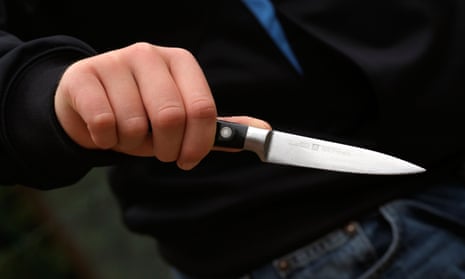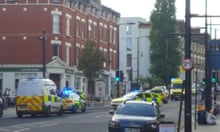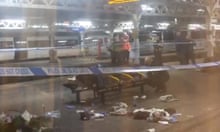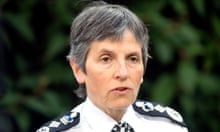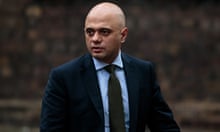Police have recorded another surge in violent offences including murder, manslaughter and stabbings as the number of police officers and detection rate plunged to a record low.
In an alarming day for crime and policing, a rush of statistics prompted warnings of a “public health emergency”, an “epidemic of violence” and claims the country is “sleepwalking into a nightmare”.
Police-recorded offences involving knives or sharp instruments rose by 16% to 40,147 in England and Wales, according to figures for the year to March published by the Office for National Statistics (ONS).
The total number of homicides – murder and manslaughter – rose by 12% from the previous year to 701, excluding exceptional incidents with multiple victims such as the terrorist attacks in London and Manchester.
Gun crime rose but at a less pronounced rate than knife crime, up 2% to 6,492 offences in the period.
Sarah Jones, the Labour MP and founder and chair of the all-party parliamentary group on knife crime, said: “It’s official, knife crime is at the highest level on record. The proportion of murders involving a knife has jumped from 30 to 40%, and across the country young people are living with fear and trauma. Today’s figures confirm that this is a public health emergency.
“The argument is being made by politicians of all sides, by campaigners, youth workers and other frontline professionals,” she said. “We don’t need more reviews from government, we need concrete action. We need a dedicated unit in government to work across departments to cure the growing epidemic of violence in our communities.”
Separate statistics released by the Home Office showed the number of police officers had fallen to 122,404 as of 31 March, from 123,142 a year ago. It represents the lowest number of police officers since comparable records began in 1996.
Another Home Office document released at the same time showed that police forces had closed almost half (48%) of cases with no suspect having been identified. This figure rose to 75% for theft offences.
The proportion of crimes that had resulted in a charge or summons to court fell from 11% to 9% – less than one in 10. This is a record low since a new system of measuring the detection rate was launched in 2015.
The document explained that part of the cause behind this decline in the detection rate was a changing crime mix – with rising numbers of complex crimes such as sexual abuse - and an increasing volume of digital evidence that may require more intensive work to investigate.
The shadow policing minister, Louise Haigh, said the 9% detection rate was “absolutely appalling”.
There was a surge in violent crime in early 2018, particularly involving stabbings in London, raising fears of an epidemic and prompting ministers to draw up a serious violent crime strategy.
Ché Donald, the vice-chair of the Police Federation of England and Wales, which represents tens of thousands of police officers, said: “These new figures are proof, as if we even needed it, that policing in the UK is on the critical list.
“Not only has knife crime gone through the roof, but murders are also escalating. Last year there were 701 murders – that’s more than the number of troops who have died in the entire Afghan conflict since 2001.
“And yet, thanks to government funding cuts, we now have the lowest number of police officers since 1996. The figures show we have lost more than 21,300 officers since 2010 – that’s a drop of 15% and the numbers keep going down every year. It’s like Groundhog Day.”
Donald added: “We have a government who recently launched their serious violence strategy – yet failed to make one single mention of the falling numbers of officers, which they were rightly criticised for. You would think that every time we have the same conversations about rising crime, particularly violent crime, it would be a wake-up call for the government. But instead it just feels like we are sleepwalking into a nightmare.”
According to the Crime Survey for England and Wales – a separate assessment to police-recorded offences that aims to measure people’s experience of crime – two in 10 adults were victims of crime in the period. This proportion has fallen considerably over the long term.
Caroline Youell, an analyst at the ONS, said: “Most people don’t experience crime. Today’s figures show a fairly stable picture in England and Wales for most crime types. It is too early to say if this is a change to the long-term declining trend.”
Both the crime survey and police-recorded figures showed increases in vehicle-related theft in the year to March. There were increases in burglaries, up 6% to 437,537, and robberies, up 30% to 77,103. The rise in robberies may reflect a real increase in the crime but also an improvement in recording practices, the ONS said.
In one of her last actions as home secretary, Amber Rudd launched a serious violence strategy to clamp down on violent crime, which has been rising since 2014. The strategy is to be backed by £40m of Home Office funding and an offensive weapons bill to ban the sale of corrosive liquids to under-18s and introduce tougher restrictions on buying knives online. The strategy will focus on the links between drug trade, particularly for crack cocaine, and violent crime.
The strategy was launched amid controversy over the potential link between dwindling police numbers and the rise in violence.
